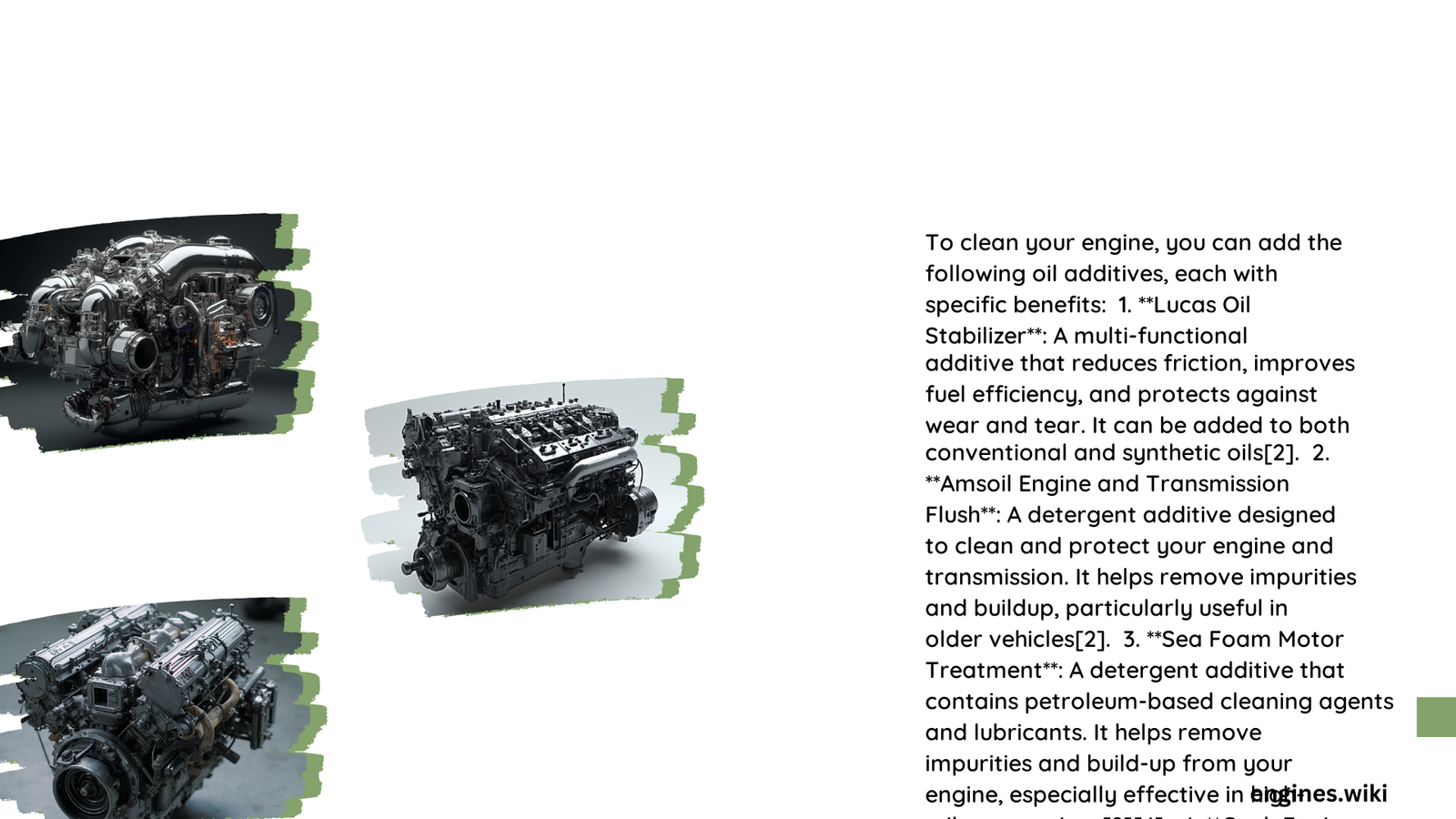Adding the right products to your engine oil can help clean and protect your engine, improving its performance and longevity. This article explores various additives you can use to clean your engine, their benefits, and how to use them effectively. From engine flushes to ceramic-based protectants, we’ll cover the best options for maintaining a clean and efficient engine.
What Are the Best Engine Oil Additives for Cleaning?
When it comes to cleaning your engine through oil additives, several products stand out:
- Engine Flush: Specifically designed to remove deposits and sludge.
- Ceramic-based Additives: Create a protective coating on metal surfaces.
- Detergents and Dispersants: Keep contaminants suspended in the oil.
Let’s dive deeper into each of these options.
How Does an Engine Flush Work?

An engine flush, such as Liqui Moly Engine Flush, is a powerful cleaning agent that you add to your oil before changing it. Here’s how it works:
- Add the flush to your engine oil.
- Run the engine for 10-15 minutes.
- Drain the oil, taking the suspended contaminants with it.
- Replace with fresh oil.
Engine flushes are particularly effective at removing:
- Sludge
- Varnish
- Carbon deposits
- Other harmful contaminants
They’re safe for use in most gasoline and diesel engines, including those with turbochargers or superchargers.
What Are the Benefits of Ceramic-based Additives?
Ceramic-based additives, like Liqui Moly Cera Tec, offer unique benefits:
- Create a protective layer on metal surfaces
- Reduce friction and wear
- Improve engine performance
- Extend engine life
To use these additives:
- Add them to your fresh engine oil after an oil change.
- The ceramic particles will form a durable coating on engine components.
How Do Detergents and Dispersants Clean My Engine?
Detergents and dispersants are crucial components in many oil additives. They work by:
- Keeping solid particles suspended in the oil
- Preventing contaminants from settling on engine surfaces
- Allowing impurities to be removed during oil changes
These additives are often included in high-quality motor oils but can also be found in aftermarket products.
What Should I Consider Before Using Oil Additives?
Before adding any product to your engine oil, consider the following:
- Compatibility: Ensure the additive is compatible with your engine type and current oil.
- Quality: Choose reputable brands that have undergone rigorous testing.
- Timing: Follow instructions carefully, especially for products like engine flushes.
- Potential Risks: Improper use can lead to engine damage or voided warranties.
How Much Do Engine Cleaning Additives Cost?
The cost of engine cleaning additives can vary:
| Product Type | Typical Cost Range |
|---|---|
| Engine Flush | $10 – $20 |
| Ceramic Additive | $20 – $40 |
| Detergent/Dispersant | Varies (often included in motor oil) |
Are There Any Natural Alternatives for Engine Cleaning?
While not as effective as commercial products, some natural alternatives include:
- Marvel Mystery Oil: A blend of petroleum-based oils and additives
- Automatic Transmission Fluid (ATF): Can help clean light deposits
- Seafoam: A multi-purpose additive that can be used in oil
However, these should be used cautiously and only after consulting with a mechanic.
How Often Should I Use Engine Cleaning Additives?
The frequency of using engine cleaning additives depends on several factors:
- Your vehicle’s age
- Driving conditions
- Manufacturer recommendations
As a general rule:
- Engine flushes: Every 3-4 oil changes or annually
- Ceramic additives: Every oil change or as recommended by the manufacturer
- Detergents/dispersants: Typically included in regular oil changes
Always consult your vehicle’s manual and a trusted mechanic before establishing a routine.
What Are the Signs That My Engine Needs Cleaning?
Look out for these indicators that your engine might benefit from cleaning additives:
- Decreased fuel efficiency
- Rough idling or stalling
- Unusual engine noises
- Visible exhaust smoke
- Loss of power or performance
If you notice any of these signs, it might be time to consider using an engine cleaning additive.
Remember, while additives can be beneficial, they’re not a substitute for regular maintenance and oil changes. Always prioritize following your vehicle manufacturer’s recommendations for optimal engine health and longevity.
